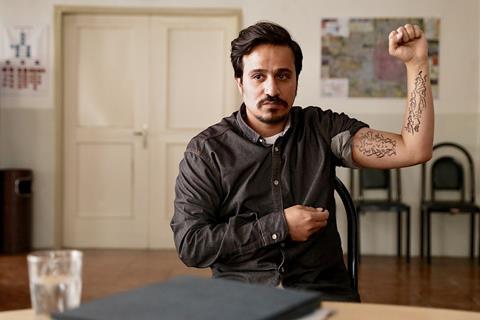Iranian filmmakers Ali Asgari and Alireza Khatami present a series of vignettes building up to a social picture

Dir/scr: Ali Asgari, Alireza Khatami. Iran. 2023. 77mins
The quotidian mechanics of social repression are crisply evoked in Terrestrial Verses, the first directorial collaboration between rising Iranian talents Alireza Khatami and Ali Asgari. Premiering in Un Certain Regard at Cannes, this is a compendium of nine steely little vignettes bookended by more cinematic prologue and epilogue segments. Running at a brisk 77 minutes, the film will, given the ongoing global interest in current Iranian matters, have little difficulty obtaining further festival exposure.
The picture itself somehow ends up less than the sum of its often-impressive parts
While there is no doubting the filmmakers’ admirably humanistic and progressive intentions, however, the picture itself somehow ends up less than the sum of its often-impressive parts. The problem is perhaps one of repetitive structure: the nine ’chapters’ — each introduced by a title-card featuring a character’s name — are of roughly equal length, between six and nine minutes (they tend to get longer as the film progresses), each consisting of fixed-camera shots showing a sympathetic individual speaking with an unseen, unhelpful, stern voice of authority.
In several instances the latter is representative of bureaucratic government: the sixth sees Farbod (Hossein Soleimani) trying to get a driving license and being rudely quizzed about his “abnormal” tattoos. In the fourth, Sadaf (Sadaf Asgari), falls foul of the law after apparently driving without the legally-required hijab veil.
Asgari, niece of writer-director Ali Asgari, attracted much acclaim as star of his feature-debut Disappearance, which premiered in Venice’s Orizzonti in 2017 (Khatami’s only other feature-length directorial outing is the Spanish-language, Chile-shot Oblivion Verses.) She again impresses here, as perhaps the most defiantly fiery of the nine protagonists, and can be viewed as an emblematic of the ’Woman, Life, Freedom’. movement in Iran which has gripped worldwide attention in the last nine months.
Off-screen, meanwhile, Alireza Alaviyan’s sound-design consistently conjures teeming environments beyond the frame. The prologue, a widescreen timelapse panorama of Tehran at dawn, is a striking showcase of his talents: the calm of night yields to the overwhelming cacophony of a huge metropolis collectively stirring itself from slumber.
The nine sections that make up the bulk of Terrestrial Verses are, in contrast, executed in confining 4:3 format (and a muted palette of greys and blues) by cinematographer Adib Sobhani — this boxiness unsubtly emphasising the constrictions and claustrophobia of life in the Iranian theocracy. The screenplay includes welcome touches of dark, wry humour, most notably in ‘Ali’ the penultimate tale, in which an exasperated film-maker has his work rendered meaningless by a softly-spoken but unyielding representative of Kafkaesque cultural censorship.
Sobhani reverts to widescreen for the apocalyptic epilogue, featuring a wordless cameo from Ardeshir Kazemi as an exhausted but possibly godlike individual identified in press notes as ’100-year-old man’. This sequence casts all that has come before into an intriguingly different light, hinting at the powerful, pent-up energies (both political and creative) which many believe may positively convulse Iran in the coming months and years.
Production companies: Taat Films, Seven Springs Pictures, Cynefilms
International sales: Films Boutique, contact@filmsboutique.com
Producers: Ali Asgari, Milad Khosravi
Cinematography: Adib Sobhani
Production design: Hamed Aslani
Editing: Ehsan Vaseghi
Music: Masoud Fayaz Zadeh
Main cast: Majid Salehi, Gohar Kheir Andish, Farzin Mohades, Sadaf Asgari, Hossein Soleimani, Faezeh Rad, Bahram Ark, Sarvin Zabetiyan, Arghavan Shabani























